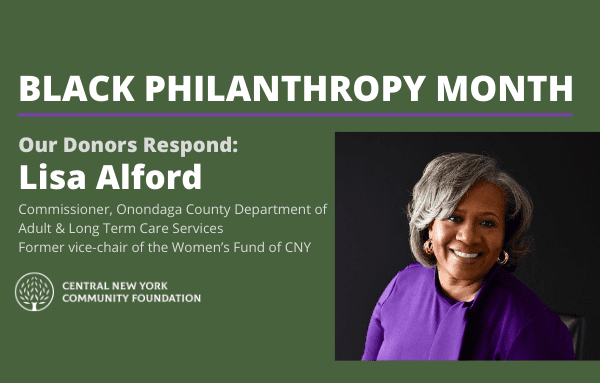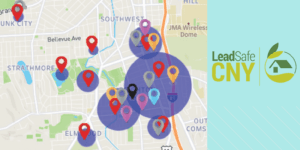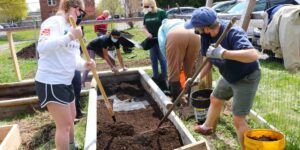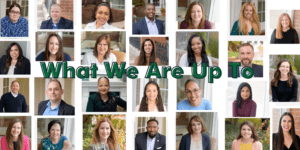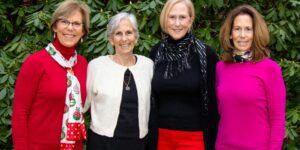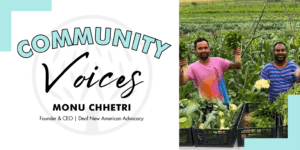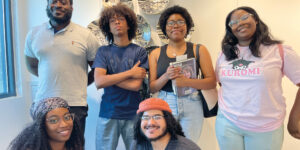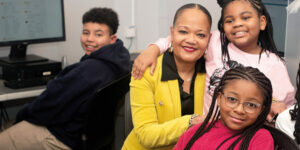August is Black Philanthropy Month! We asked our donors how they came to be philanthropists.
Here’s what Lisa Alford had to say:
How did you come to be charitable? Were there influences in your life that got you started?
Through faith, family and fellowship.
My family taught me how people can give in various ways. My parents were both active in our church and community. As educators, much of what my parents did for students went beyond what they got paid to do – be it providing students with clothing, encouragement, mentorship or assistance finding jobs. They helped make connections and gave opportunity. My paternal grandmother came from humble means and would often sell dinners and cakes to support her church. My maternal grandmother was very active in our church and served her community as a member of the Order of the Eastern Star, a Masonic organization. I also had another older 2nd cousin who would make and sell quilts and dolls to raise money for the community center.
In addition to being active in our church, my parents were both involved in their graduate chapter fraternity (Kappa Alpha Psi Fraternity, Inc.) and sorority (Alpha Kappa Alpha Sorority, Inc.) organizations. I followed in my Mom’s footsteps through my involvement with the Alpha Kappa Alpha Sorority, which also includes Senator Kamala Harris among its members. There is a long and rich history of African-American sororities and fraternities whose social mission is built around a commitment to service and leadership. One of my proudest moments occurred while serving as president of AKA, when we worked together with other female Black affinity groups in the community, including other Black sororities and women’s civic groups like the Muslim Women’s Association, to assist the American Heart Association in launching an initiative to address heart issues affecting the Black community. Some of the women I already knew and some I didn’t. We strengthened our network by bringing together different groups with different audiences, which in turn led to broader community engagement and participation. Not only did this effort meaningfully involve people with different perspectives and different ways of being, but it also affirmed the truth that Black health matters.
Historically Black colleges and universities (HBCUs) also played an important role in the education of several generations of my family, myself included, and continue to hold relevance today. My family has provided financial support to several HBCUs, mainly to Hampton University which I attended, Fisk University which my mom attended and Allen University, my father’s alma mater. It was an incredibly affirming experience not to have to deal with the issue of race being something I had to navigate for four years of my life. The history and symbolism of these institutions are meaningful reminders to me of the opportunity I had that others did not and of all the people who succeeded in spite of what they were denied.
What do you want Central New York to look like in the future? How can philanthropy be a part of that change?
I wish to see change that is brought about by empathy, intention, courage and opportunity, not just charity. I hope that we can address many of the ongoing disparities that exist within our community and commit to having honest, critical, and life-changing conversations that move us along to action so we can make a community that is great for people of all ages, races, genders, abilities and identities.
We can start by being intentional about the choices we’re making. First, we need to look inward. At ourselves and our institutions. When we host events and gatherings, where do we go for catering? Are we considering black-owned business enterprises? The last time I ordered box lunches for my staff at work, I ordered from Miss Prissy’s Catering. I had first become aware of her at a business pitch competition hosted by KeyBank and she will soon be a featured vendor at Salt City Market when it opens in fall 2020.
Do our staff, boards and executive teams reflect the community? When I worked at PEACE, Inc., the Head Start Program and many of the other War on Poverty programs that began during the administration of President Johnson, had a guiding principle called maximum feasible participation, which ensured that people receiving our services had an active voice and involvement in the creation and representation of service delivery and programs.
How do we seek out diverse persons to create opportunity and promote meaningful participation? They may not live in our neighborhood or attend our church or temple. We cannot wait for issues to greet us at our own front door. We can reach out. We can build bridges. We can speak to other people. We can speak their names in spaces where they may be unknown to give others an opportunity. We can connect.
What do you feel are the greatest needs in our community right now?
The issue of poverty and all the issues that stem from it through cause and effect (lead poisoning, health disparities and bias in healthcare, I-81, redlining, etc.); the issues of mental health and substance use, which has been critically impacted by the pandemic due to increased isolation, loss of work and funding cuts; and the issue of systemic racism.
When we look at policy, data and outcomes, we need to consider and address systemic factors. It can be hard to turn the mirror on ourselves, individually and systemically. But if we are committed to long-lasting change, we need to also commit to the courageous and critical interactions and actions that will enable and sustain it. We must first understand how historical policies and practices have shaped outcomes and created disparities. Going forward, we must take active steps to create policies and practices that do not reinforce disproportionate outcomes or deepen disparities. This will require a more equitable distribution of power, control, leadership and decision-making.
Is there a quote that sums up or has shaped how you live your life?
To whom much is given, much will be required (Luke 12:48). Great gifts mean great responsibilities; greater gifts, greater responsibilities. I think we’re supposed to share. By pouring into others what has been poured into us.
Giving and philanthropy isn’t just about money. It’s about time, talent and resources. Wherever we have the opportunity to advocate for others, we should. We’re not here for us alone; we’re here to speak for people who may not have a voice at the tables where the decisions are made. Everybody has a way that they can offer something at the family table of the world. Everyone has something they can contribute. We all have value and there is no lesser than. There are people who have poured into others who never gave a dime. They have shared an encouraging word or prayed or meditated on a person’s success.
Lisa Alford is Commissioner at the Onondaga County Department of Adult & Long Term Care Services and the former vice-chair of the Women’s Fund of CNY.
